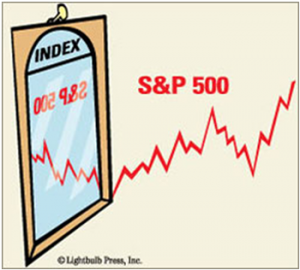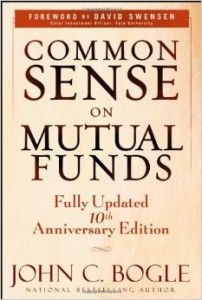 NOTE: This post is part of an ongoing education series. This information is for educational purposes only. This information does not constitute investment advice. Please consult with your financial advisor before taking any action. For planning advice contact Polaris Financial Planning.
NOTE: This post is part of an ongoing education series. This information is for educational purposes only. This information does not constitute investment advice. Please consult with your financial advisor before taking any action. For planning advice contact Polaris Financial Planning.
Stock
Before we get into the two main types of Index Funds (Managed vs. Index) I want to take a step back and define what a stock is. We have this definition from Investopedia...
A type of security that signifies ownership in a corporation and represents a claim on part of the corporation's assets and earnings. Also known as "shares" or "equity."
In plain English you own a part of a company. Usually a VERY small part of a company but, you are still an owner. If the company does very well you can make a lot of money but, if they do poorly you can also lose all of your money. Remember Enron?
Mutual Fund
 This is why you don't want to put all of your money into one company (or one stock). It is risky! Like the old saying..."Don't put all of your eggs in one basket."
This is why you don't want to put all of your money into one company (or one stock). It is risky! Like the old saying..."Don't put all of your eggs in one basket."
A simple way to reduce specific stock risk (as measure by volatility) is to own more than one stock. Studies have shown that owning 10 stock can limit your volatility (risk) by half and 30 stocks reduces your stock risk to almost the same level as owning 500 stocks.
For more on the value of diversification read this….
If you bought 30 stocks and invested $10,000 in each one, you would need $300,000 to have a diversified stock portfolio. Each time you want to add money you would have to buy more shares in one of the stocks (or all 30) and pay commissions. If you are in a taxable account you have to keep careful records of all of the prices so you don't pay more than required in taxes.
For most people this is just too difficult and they are better off is someone else does the work for them. This is what a mutual fund does.
According to Investopedia the modern mutual fund began in 1924.
The creation of the Massachusetts Investors’ Trust in Boston, Massachusetts, heralded the arrival of the modern mutual fund in 1924.
A mutual fund allows people with small amount of money (<$10,000) the ability to invest in the stock market and reduce their risk (vs. one stock). You can easily add (or remove) money and the mutual fund does all of the work.
Wikipedia lists these advantages for mutual funds….
- Increased diversification: A fund must hold many securities. Diversifying reduces risks compared to holding a single stock, bond, other available instruments.
- Daily liquidity: Shareholders may trade their holdings with the fund manager at the close of a trading day based on the closing net asset value of the fund’s holdings.
- Professional investment management: A highly variable aspect of a fund discussed in the prospectus. Actively managed funds funds may have large staffs of analysts who actively trade the fund holdings.
- Ability to participate in investments that may be available only to larger investors: Foreign markets, in particular, are rarely open and affordable for individual investors.
I agree with all of the above points but, they add one more.....
- Ease of comparison: Picking a mutual fund is a lot like judging a dog show. You select the best of the breed which has the qualities you seek.
I disagree. It is very hard to pick a good mutual fund and they can have high costs.
Index Fund
An index fund is a specific type of mutual fund. Here is their definition of an Index Fund from Investopedia....
A type of mutual fund with a portfolio constructed to match or track the components of a market index, such as the Standard & Poor’s 500 Index (S&P 500). An index mutual fund is said to provide broad market exposure, low operating expenses and low portfolio turnover.
 I’m not sure why they say, “… is said to provide…”. An Index fund actually does these things. I get some of the numbers below from and I highly recommend "Common Sense on Mutual Funds" by John C. Bogle. (Note: The title is indeed a nod to Thomas Paine)
I’m not sure why they say, “… is said to provide…”. An Index fund actually does these things. I get some of the numbers below from and I highly recommend "Common Sense on Mutual Funds" by John C. Bogle. (Note: The title is indeed a nod to Thomas Paine)
Broad Market Exposure
The S&P index fund invests in 500 stocks. 500 different US companies. This is very broad exposure. If one of those 500 stocks goes to $0.00 in just one day it will only bring down your portfolio ~0.2%. The whole market can move more than that in a day. This also works on the upside, if one of those 500 stocks double it will only give you about a 0.2% bump. This broad market exposure effectively eliminates your stock specific volatility (risk).
Low Operating Expenses
The average mutual fund can have many types of expenses.
The first thing you need to look out for is the load (usually a fee you pay to invest) and this can be as high as 8.5%. This comes out of what you "invested". You now have to make 9.3% just to break even.
Many managed funds add a fee called 12b-1 and it can be as high a 1%. Via investopedia...
Back in the early days of the mutual fund business, the 12b-1 fee was thought to help investors. It was believed that by marketing a mutual fund, its assets would increase and management could lower expenses because of economies of scale. This has yet to be proved. With mutual fund assets passing the $10 trillion mark and growing steadily, critics of this fee, which today is mainly used to reward intermediaries for selling a fund's shares, are seriously questioning the justification for using it. As a commission paid to salespersons, it is currently believed to do nothing to enhance the performance of a fund.
To manage your money the mutual fund collects a fee called the "Expense Ratio". The industry average is 1.50% per year and 25% of all stock funds are above 2.20% per year. There is no limit on how high this fee can be. As of 6/30/14 there were 220 Mutual funds with a fee of 3.00% with the highest at a stunning 23.00%! You can get the Vanguard Total Stock Market Index for an Expense Ratio of 0.05%!
Trading Costs
Every time your mutual fund buys or sells, you pay the fees. This is not listed anywhere and it is hard to calculate but for the average fund this costs you an additional 0.50%.
Taxes
If you are in a taxable account trading can really hurt your performance. If a stock is held for more than a year than you will only pay capital gains of 0%-20%. However, a stock sold in less than a year can be taxed from 10% to 39.6% (depending on your income level)! An S&P index fund may change only 2-4 % of the funds in a given year. An average mutual fund can change 100% or more of its stocks in one year. Even if your managed fund beats the market you may get killed on taxes.
